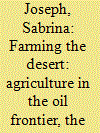| Srl | Item |
| 1 |
ID:
161476


|
|
|
|
|
| Summary/Abstract |
This article examines the social and political factors that contributed to the development of agriculture in the United Arab Emirates (UAE) from the 1940s onwards, expanding upon Jason Moore’s concept of the ‘commodity frontier’. Beginning in the mid-twentieth century, agricultural production emerged as a ‘secondary commodity frontier’ propelled by the primary commodity in the region—oil. The example of the UAE illustrates how the dynamics inherent in the primary commodity frontier can generate ‘secondary frontiers’. Furthermore, commodity frontiers are not necessarily exclusively motivated by market forces, as emphasized by Jason Moore. Indeed, the spread of agriculture in the UAE was not primarily tied to the export of any particular crop. Rather, the newly formed state after 1971, like colonial forces prior to this period, promoted agriculture in part to improve local people’s standard of living. Modern agriculture, furthermore, transformed local power structures and facilitated the country’s transition from a traditional to a modern state and its integration into a global capitalist economy.
|
|
|
|
|
|
|
|
|
|
|
|
|
|
|
|
| 2 |
ID:
168576


|
|
|
|
|
| Summary/Abstract |
This article examines gotong royong as social citizenship in the second half of the twentieth century in Indonesia. Gotong royong was traditionally understood as a collective spirit among neighbours to strengthen economic and social resilience. However, the institutionalisation of the system through massive development programmes since the 1940s has influenced the common people's perception and practice of it. This article argues that the co-option of gotong royong as part of the discourse of nation-state building transformed the popular view of labour and capital mobilisation from an openly critical stance to apparent submission. Gotong royong became a means of social engineering and an ingenious linguistic strategy by which state elites orchestrated control over the making of citizens. Still, Indonesians have remained vigilant of their participation in gotong royong, and about the potential for its misuse by corrupt officials.
|
|
|
|
|
|
|
|
|
|
|
|
|
|
|
|